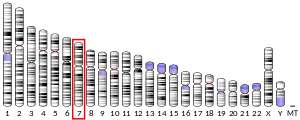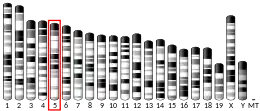KMT2E
Lysine methyltransferase 2E is a protein that in humans is encoded by the KMT2E gene. [5]
Function
This gene is a member of the myeloid/lymphoid or mixed-lineage leukemia (MLL) family and encodes a protein with an N-terminal PHD zinc finger and a central SET domain. Overexpression of the protein inhibits cell cycle progression. Alternate transcriptional splice variants have been characterized.
Clinical importance
Mutations in this gene have been associated with intellectual disability, autism, macrocephaly, hypotonia, functional gastrointestinal abnormalities and epilepsy.[6]
References
- GRCh38: Ensembl release 89: ENSG00000005483 - Ensembl, May 2017
- GRCm38: Ensembl release 89: ENSMUSG00000029004 - Ensembl, May 2017
- "Human PubMed Reference:". National Center for Biotechnology Information, U.S. National Library of Medicine.
- "Mouse PubMed Reference:". National Center for Biotechnology Information, U.S. National Library of Medicine.
- "Entrez Gene: Lysine methyltransferase 2E". Retrieved 2016-06-02.
- O'Donnell-Luria AH, Pais LS, Faundes V, Wood JC, Sveden A, Luria V, et al. (May 2019). "Heterozygous Variants in KMT2E Cause a Spectrum of Neurodevelopmental Disorders and Epilepsy". American Journal of Human Genetics. 104 (6): 1210–1222. doi:10.1016/j.ajhg.2019.03.021. PMC 6556837. PMID 31079897.
Further reading
- Emerling BM, Bonifas J, Kratz CP, Donovan S, Taylor BR, Green ED, Le Beau MM, Shannon KM (2002). "MLL5, a homolog of Drosophila trithorax located within a segment of chromosome band 7q22 implicated in myeloid leukemia". Oncogene. 21 (31): 4849–54. doi:10.1038/sj.onc.1205615. PMID 12101424.
This article incorporates text from the United States National Library of Medicine, which is in the public domain.
This article is issued from Wikipedia. The text is licensed under Creative Commons - Attribution - Sharealike. Additional terms may apply for the media files.



